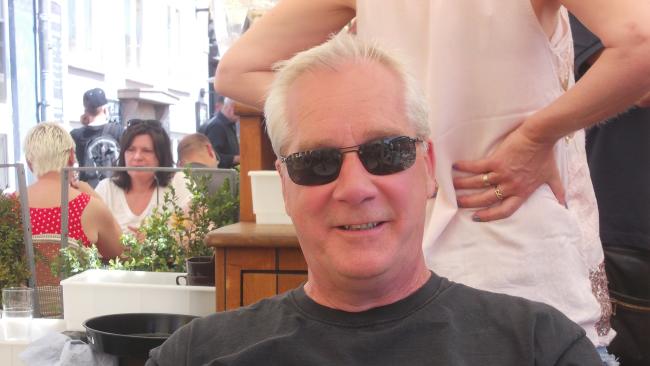
Meet the mentor: Derek West (1979)
╠└═╖╠⌡╘¡┤┤ has an innovative Careers and Mentoring Programme matching current students and recent alumni with experienced alumni and leaders in their fields. One of our mentors Derek West (1979), tells us more about his career, his mentoring experience, and his advice for others about to embark on the mentoring process.
Can you tell us more about your time at Jesus and how you started out?
I studied English at Jesus 1979-82 and was privileged to be taught by the remarkable trio of Howard Erskine-Hill, Stephen Heath and Lisa Jardine. After graduation I didnΓÇÖt have a clue what I wanted to do, and for a while I wavered between continuing academic studies or trying something new. I finally decided to go into the world of business, and at that time a common route was through becoming a Chartered Accountant. This seemed to offer a good combination of on-the-job experience and formal exam-based training. With the arrogance of (Oxbridge) youth I thought that if I could pass exams in English I could do so in Accounting. I did, but they were by far the hardest exams I have ever taken!
Having qualified with a ΓÇÿbig sixΓÇÖ firm I decided auditing was no longer for me, and I joined the finance department of the UKΓÇÖs third-largest package holiday firm. This was a great experience ΓÇô in the space of three years we took over two rivals and were ourselves taken over twice. The travel business was ΓÇô and remains - extraordinarily cut-throat and every day was a new lesson in flexibility and resilience. I was promoted to chief accountant, so had responsibility over all aspects of financial and management accounting, and more importantly over a large team. Eventually we were taken over by what is now Tui, and it was time to move on.
What happened next?
I joined the UKΓÇÖs largest brewery and was able to use my financial and commercial expertise to advise on all manner of projects across the business, as the company ΓÇô and the industry ΓÇô experienced unprecedented changes throughout the 1990s. Some of the bigger, more transformational projects involved working closely with management consultants, which was a great learning experience, and helped to shape my future career. I also got an MBA at this time. My role at the brewery largely consisted of getting finance, IT and ΓÇÿbusinessΓÇÖ people to speak the same language, and when it was time to move on again (this time to a global consultancy firm) I continued to do the same. I have been working for the same firm for 24 years, firstly as an employee and more recently as an ΓÇÿassociateΓÇÖ having gone freelance in the 2000s. One of the great aspects of consultancy is the sheer variety of different projects, clients, and environments you can experience. I have worked in manufacturing, supply chain, telecoms, and retail, as well as local and national government. I also spent a year helping to decommission obsolete nuclear power stations ΓÇô a long way from James Joyce and Tess of the DΓÇÖUrbervilles!
How did you find yourself working as a trainer?
As I said, I started my own company in 2005, and initially intended to continue offering consultancy. However, before I left my employer (to my surprise) asked if I would come back on a freelance basis to deliver the training programmes, I had started to give the previous year. I had never thought of myself as a trainer, and indeed was usually terrified on the rare occasions I had to give presentations. However, once I had started to do it regularly ΓÇô and with a bit of positive feedback from participants and fellow trainers ΓÇô I really enjoyed it and was very pleased to be invited back. It rapidly developed from a small part of my business to my main source of work. I have been lucky enough to train and facilitate across 20 countries in 3 continents and gained some wonderful friendships and memories along the way.
What sort of courses do you offer?
I have run courses on a number of different topics involving finance, business and management for many different organisations, but my core offering is a variation on the course I experienced on first becoming a consultant. It is a week-long course and introduces new graduates (and those new to consulting) to what they might expect, and how they might thrive, in the world of consultancy. This includes - how to present themselves, how to interact with clients, how to run meetings, how to work in teams, how to deal with resistance, and how to communicate effectively. It has been described as an ΓÇÿMBA in a weekΓÇÖ. Everything is done interactively and experientially, as the participants have to deal with us as we play the ΓÇÿtoughΓÇÖ client through a series of real-life interactions.
Can you tell us more about your mentoring experience?
I have been fortunate to meet, and work with, about 6,000 graduates over the past 18 years, and gone on to advise and mentor many of them. I have been a management consultant, and a client of management consultants, so I believe I have some insight into what it takes to succeed in that industry. It is particularly satisfying to work with arts/humanities graduates, whose skills are particularly suited to roles in business and consultancy, even though they might not always think so!
Derek can be contacted on the College's mentoring and networking platform.
The views and opinions expressed in this article belong to Derek West (1979).





